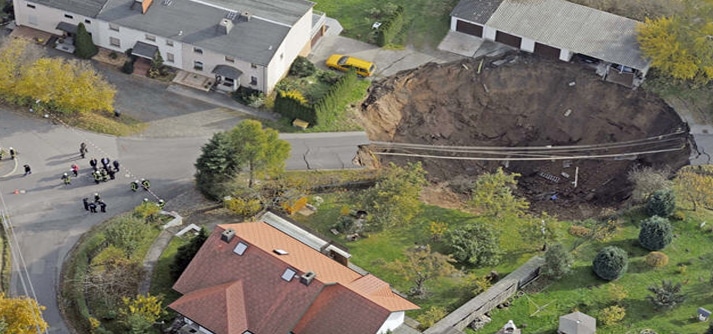The Sinkhole in Land O’ Lakes, Florida
Recently, a huge sinkhole in Land O’ Lakes, Florida, swallowed two homes, a boat, part of a road, and a driveway. In addition, five other homes near the 225 foot sinkhole have been declared unsafe.
As the community in Pasco County north of Tampa waits to make sure the sinkhole is stable, heavy equipment is being brought in to clear away debris, water samples are being taken, and insurance adjusters are assessing the damage to the homes their companies insure.
Meanwhile, the rest of us in Florida watch in horror as videos of the hole swallowing whole houses are broadcast on TV news stations and the internet. Many of us have empathy for the people who lost their homes. Many of us are also wondering what we would do if a giant hole in the earth opened up and sunk are homes. Would we be insured? Would we be able to rebuild our homes? Would we be able to replace our belongings and move on with our lives?
Florida Sinkhole Facts
While answers to questions about insurance coverage for sinkhole damage can be complex (more about that later), the facts about sinkholes are readily accessible. For instance, Florida has more sinkholes than any other state in the U.S.
This isn’t because Florida is especially cursed or because Floridians are especially harmful to their environment. The reality is that the layer of carbonate rock under the mixture of sand and clay that makes up the Florida peninsula can dissolve over time, producing sinkholes, caves, springs, disappearing and reappearing streams, and other depressions in the land.
Both heavy rainfall and heavy pumping of groundwater can contribute to the development of sinkholes. However, even if there were a way to control rainfall and pumping, sinkholes would most likely still develop because of the groundwater naturally occurring in the carbonate rock that makes up the state’s ground.
Florida Insurance Law
Until recently, sinkhole damage was covered under most homeowners’ insurance policies. However, in 2007, the state legislature changed the coverage standard with the passage of Florida Statute 627.706. This law requires insurance companies to provide coverage for catastrophic ground cover collapse, but not necessarily damage from a sinkhole. Broader coverage for damage considered less than catastrophic ground cover collapse is now optional, with an additional cost.
For your Florida homeowner’s insurance to cover damage from catastrophic ground cover collapse, four conditions have to be met:
- The sinking has to have occurred abruptly.
- A depression in the ground must be visible without the use of instruments.
- The home must have suffered structural damage, including the foundation.
- A government agency has to condemn and evacuate the structure.
Other types of damage from sinkholes, including cracking of a structure, do not qualify as catastrophic collapse and will not be covered by your insurance company unless you have separate sinkhole coverage.
Insurance companies have to offer this separate coverage for an additional premium, but they can require an inspection before issuing the policy, and they can include a deductible amount of 1 percent, 2 percent, 5 percent, or 10 percent of the policy limits. They can also limit catastrophic ground cover collapse and sinkhole damage to the main building listed in the policy.
Even with a separate sinkhole policy, damages to your home might not be covered. To qualify as a sinkhole loss, the damage to your home must include structural damage that includes the foundation; the foundation movement must be greater than an acceptable variance in the building code; and the foundation movement must make the building’s structural systems unable to support the loads they were designed for.
In addition, to these requirements, there is a 2-year limit for filing sinkhole damage claims, as well as time limits for testing, signing of repair contracts, and having repairs completed.
If Your Home Has Suffered Sinkhole Damage
Insurance policies and procedures can be very complex, especially when you’re dealing with damage to your home. An experienced insurance claims attorney can help you navigate the complexities and get the money you need to make necessary repairs.
If your sinkhole claim has been denied or your insurance company has paid you a lower amount than expected and needed, you have the right to appeal their decision. Your insurance company could have misled you or neglected the terms of your policy.
In our experience, insurance companies respond quicker and more favorably when they know you have a seasoned insurance attorney working for you.
Call Malik Law today at 407-500-1000 or submit the Free Case Evaluation form on our website so we can get started working on getting you the money you deserve from your insurance company.
Sources
Florida Department of Environmental Protection. (2012). “Florida Geological Survey – Sinkholes.” https://www.dep.state.fl.us/geology/sinkholes/index.htm
The Florida Legislature. “The 2016 Florida Statutes.” http://www.leg.state.fl.us/STATUTES/index.cfm?App_mode=Display_Statute&Search_String=&URL=0600-0699/0627/Sections/0627.706.html
Florida Office of Insurance Regulations. “Sinkholes.” http://www.floir.com/sections/pandc/sinkholepage.aspx

